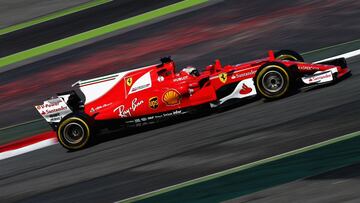Shark fins need addressing, says F1 boss Brawn
'Shark fins' and DRS are two things Ross Brawn is keen to address in his role as Formula One managing director.

F1 shark fins need to be looked at
Formula One managing director Ross Brawn wants to address the 'shark fins' that grace the sport's 2017 cars, and is keen to do away with DRS.
As part of regulation changes for the new season, F1 teams have launched cars with fins on the rear of the body.

Fans don't like fins
Fans and team personnel have expressed their displeasure at the aesthetically displeasing additions, and Brawn is not a fan either.
"With the new cars and new rules, we have to see how they perform and what effect that has," Brawn told the official F1 website.
"As a racing car, it looks more exciting. The proportions of the car are better.
👊 @LewisHamilton on track!!
— Mercedes-AMG PETRONAS F1 Team (@MercedesAMGF1) February 27, 2017
Yes, that's a shark fin... (Oops, we did it too 😉)#F1Testing @F1 pic.twitter.com/NUXQ27QMQL
F1 cars faster
"They're much faster; pretty impressive performance. Drivers tell me they are physically challenging, which is what was wanted. As always with new regulations, there are few little hiccups.
"We've got the unpopular shark's fin on the back. In time, I think we need to address those.
More exciting-looking cars
"Part of the objective of the new rules was to produce more exciting-looking cars, so we don't want to spoil it with peripheral bits that take away from that."
DRS was introduced to F1 in 2011 to aid overtaking, a flap on the rear wing moving when a driver gets within a certain distance of the car in front to reduce drag.
Brawn acknowledges the system was needed at the time, but wants to get to a position where the cars no longer need the assistance to help them overtake.
"We have to look at the whole topic of overtaking in racing, and how the cars can race each other and overtake each other," he added.
No future for DRS?
Related stories
"I would prefer that to be achieved by a normal process, rather than enhanced by something like DRS.
"But DRS was a solution to a problem we had at the time. I don't think we should rush into taking DRS off, but what I'd like to see is a better long-term solution to car design so we don't need DRS."